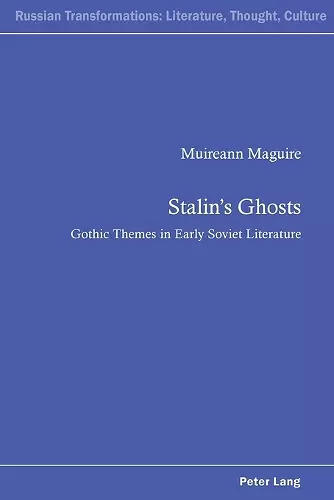Stalin’s Ghosts
Gothic Themes in Early Soviet Literature
Format:Paperback
Publisher:Peter Lang AG, Internationaler Verlag der Wissenschaften
Published:28th Nov '12
Should be back in stock very soon

Stalin’s Ghosts examines the impact of the Gothic-fantastic on Russian literature in the period 1920-1940. It shows how early Soviet-era authors, from well-known names including Fedor Gladkov, Mikhail Bulgakov, Andrei Platonov and Evgenii Zamiatin, to niche figures such as Sigizmund Krzhizhanovskii and Aleksandr Beliaev, exploited traditional archetypes of this genre: the haunted castle, the deformed body, vampires, villains, madness and unnatural death. Complementing recent studies of Soviet culture by Eric Naiman and Lilya Kaganovsky, this book argues that Gothic-fantastic tropes functioned variously as a response to the traumas produced by revolution and civil war, as a vehicle for propaganda, and as a subtle mode of unwriting the cultural monolith of Socialist Realism.
«As a standalone text, this book constitutes a valuable contribution to Soviet studies, introducing us to many lesser-known stories and writers and to new sides of more commonly studied texts. Most important, it reveals the dark underside of Soviet culture in the period from 1920 to 1940, the ghosts and vampires that haunted the dark corners of brightly-lit Socialist Realism.»
(Eric Laursen, The Russian Review Vol.72, No.4/2013)
«It is not possible within the space of a limited review to do full justice to the scope and force of this analysis.»
(Roger Cockrell, Modern Language Review Vol.109/2014)
«The variety of authors and works discussed is impressive.»
(Barry P. Scherr, Slavic and East European Journal Vol.57, No.4/2013)
«Stalin's Ghosts has succeeded in revealing the pervasive presence of the gothic in early Soviet literature.»
(Elizabeth A. Papazian, Slavonica Vol.20, No.1/2014)
«For Muireann Maguire [...] questions of genre ultimately transcend genre itself. As the title of her new study suggests, she finds her answers in the Gothic tradition, which she argues was alive and well in the Soviet Union (contrary to any reasonable assumption). In so doing, she provides a framework for rethinking Soviet culture in decidedly un-Soviet categories.»
(Eliot Borenstein, TLS August 2013)
ISBN: 9783034307871
Dimensions: unknown
Weight: 480g
331 pages
New edition